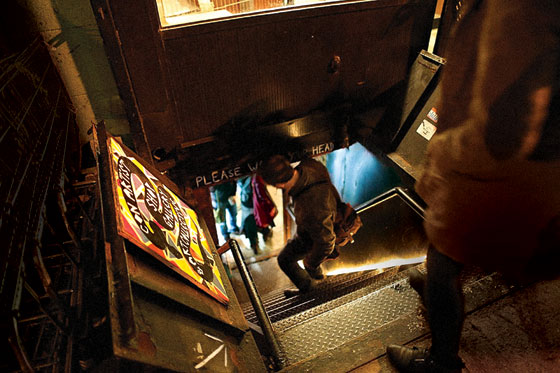
As long as New York has had its own peculiar brand of aristocracy, it has had social clubs—wood-paneled, old-moneyed sanctums where the urban elite kept company, far removed from the city scrum. Within closed societies like the Union and Knickerbocker, the latter founded by John Jacob Astor in 1871, membership meant gravitas and social ascension. Ancient Ivy outfits and old-world institutions like the Metropolitan and ladies-only Colony have held fast to their blue-blooded constituents, but the past decade has brought notable change to the private-club scene. London import Soho House opened in the meatpacking district in 2003; the Core Club, with a $50,000 buy-in fee, launched in 2005, followed by Norwood in 2007; and all manner of secretive supper clubs have surfaced. While clannish fraternities continue to breed—Soho House is lobbying hard for a Lower East Side expansion—many of the newest clubs are taking a more egalitarian tack, proliferating around the arts, food and drink (of course), and even the love of a loyal pet. Here, a look at the state of New York’s new members-only cosmos.
Key: Just How Discriminating Is It?
1/4 = A hair shy of socialist—all comers are welcome.
2/4 = Make peace with your own name-dropping.
3/4 = Modestly hermetic, but not hopeless.
4/4 = The Swiss vault of social clubs—nigh uncrackable.
For the creative kibbutznik:
ConArtist
646-504-2323; conartistnyc.com
Why join: The spirit of Warhol’s Factory is alive at this community-oriented Lower East Side arts collective, gallery, and workspace. Former Soho House manager Brian Shevlin founded ConArtist in 2010, outfitting the 1,600-square-foot Ludlow Street basement with a screen-printing press, slop sinks, iMacs, Wacom digital drawing tablets, and Arthurian wood tables. Members—100 or so painters, illustrators, self-publishers, street artists, and miscellaneous maker types—can arrange 24-hour access to the studio and store their gear and finished works in lockable bins. ConArtist also functions as a kind of community-fed soapbox, staging gallery shows, live “art battles,” and other events to support the work of its members.
Getting in: An online application poses open-ended questions about the nature of your work and provides space to link to an online portfolio. The form is circulated among the collective, and hopefuls must net 80 percent approval to join. Shevlin says that the vote is not curatorial—the group is more concerned with how each artist might enrich the greater community. Dues are $50 a year for the collective, plus $180 per month for use of the workspace.
Exclusivity: 3/4
For the laptop warrior:
501 Social
501union.com
Why join: Brooklyn kingpin Akiva Reich has broken ground on a members-only social club just across the canal from the Green Building, the wedding venue he owns in Carroll Gardens. The 9,500-square-foot space, which will open for private parties in June and membership in October, is designed with the neighborhood’s freelance creative class in mind. Vintage furnishings, plenty of outlets, and great light—provided by a 50-foot skylight—will make for an ideal place to take meetings, pound away on MacBooks, drink seasonal cocktails, and nibble snacks from a local bakery. Around 4 p.m., thoughtful programming takes over: Ping-Pong throwdowns, bingo nights, film screenings, and the like.
Getting in: Membership applications are not yet available. Reich is still sorting out the payment structure, but he says he expects dues to be around $1,500 annually (with a price break for early adopters).
Exclusivity: 3/4
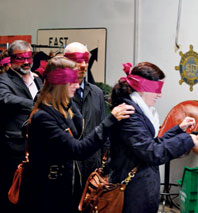
For the experimental-theater geek:
Eat My Heart Out
eatmyheartoutsupperclub.com
Why join: Theater obsessives and food cognoscenti convene quarterly at this performance-art-and-supper-club mash-up. Comedian Eugene Ashton-Gonzalez curates the storytellers—everyone from Jezebel editor Dodai Stewart to “The Moth” regular Aaron Wolfe—and chefs, who prepare dishes inspired by their tales. The dinners, typically held at a Dumbo loft, comprise five courses and five performances—many of which, says Ashton-Gonzalez, are designed to provoke conversation about food’s role in culture and community. Creativity is encouraged: Guests are given art supplies and seated at tables covered in butcher paper. Go to town.
Getting in: Ashton-Gonzalez is serious about keeping his community well-pruned. He’s looking for joiners who have a demonstrated passion for what they eat and serve. To score access to an Eat My Heart Out event, prospective members should e-mail him (
Exclusivity: 3/4
For the food-world first-responder:
Friends With Benefits
917-562-1923; friendswbseries.com
Why join: This pro-level culinary series subverts the long-trending supper-club setup: Instead of earnest amateurs cooking in a cramped apartment, Chris Mitchell—formerly the chef at haute kosher eatery Jezebel—invites his food-world pals to stage dinners and “cocktail clubs” in a Soho loft. The events, says Mitchell, are a chance for chefs to indulge their interests outside the formal restaurant setting, which means you might encounter a cook from wd-50 trading hydrocolloids for tahini-slicked lamb loin. The cocktail parties, meanwhile, are stand-up affairs, tended by superstar bartenders like Brandon Bramhall (Milk & Honey) and Franky Marshall (the Dead Rabbit, the Tippler). Events happen two or three times a month: On May 16, Brian Hawthorne of the Wayland and cult bartender Doug Quinn, late of P.J. Clarke’s, host a cocktail mixer.
Getting in: Introduce yourself online and Mitchell will add you to the mailing list. Dinners range from $95 to $150, and cocktail parties are $75.
Exclusivity: 2/4
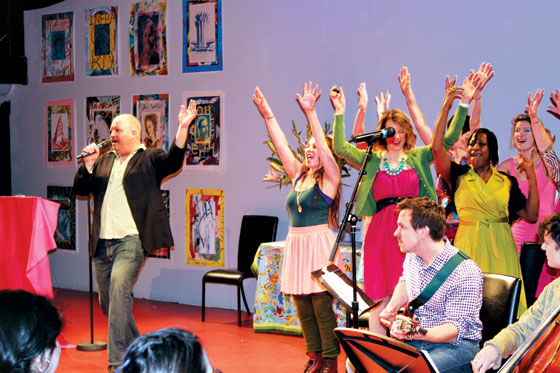
For the art agnostic:
The Secret City
thesecretcity.org
Why join: The monthly art event staged by this Obie Award–winning club is modeled after religious services, with a choir, silent meditation, and other community-building exercises in addition to the (utterly nondenominational) performances. Shows are open to all, but there’s a loyal crew of regulars who return each month to view visual art and dance, listen to live music and storytellers, and taste food “offerings” from local chefs, all inspired by a single theme, such as light, purpose, or memory. Past artists have ranged from quirky monomaniacs (harpists, tap dancers, collagists) to blockbuster talents (Rosanne Cash).
Getting in: Sign up for the mailing list online to get word of the monthly gatherings, which unfold at experimental Lower East Side theater Dixon Place. Events are free, but donations are welcome.
Exclusivity: 1/4
For the liquid aesthete:
Bower Hill Society
bowerhillsociety.com
Why join: Digital-marketing exec A. J. Lawrence’s Bower Hill Society gathers booze fetishists for monthly confabs inside his Dumbo office. Lawrence taps distillers—hoary old outfits like the Macallan and bootstrap start-ups like Owney’s rum—to present their wares, talk the 100-odd members through a tasting, and stick around for a casual Q&A. Drams and welcome cocktails are dispatched from a salvaged-wood bar, and snacks are available to keep the crowd of bankers, start-up kings, and the occasional graffiti artist on terra firma. Check out the scene on May 23, when Bower Hill invites the makers of Greenhook Ginsmiths to the floor.
Getting in: Sign up for the mailing list online to receive word of the monthly meets. There’s no fee to join, but events range from $35 to $68; partial proceeds benefit the Step Up Women’s Network.
Exclusivity: 1/4

For the urban country-clubber:
Golf & Body NYC
golfbodynyc.com
Why join: Short of practicing your swing at the populist Chelsea Piers, you’ll find that New York isn’t a particularly friendly place for golfers. So credit is due to former commodities broker Tom Schiff, who in January transformed a 25,000-square-foot space near Penn Station into a wonderland for Arnold Palmer aspirants. Among the amenities are seven HD golf simulators featuring hole-by-hole re-creations of Pebble Beach and 20 other courses, two large putting greens, a café, and a fitness center outfitted with machines chosen for their stroke-strengthening faculties. An on-site concierge assists with requests both easy (shipping a member’s gear and apparel to his travel destination) and extravagant (booking a private jet). As the weather warms, members will be able to sign up for social outings to courses in Westchester, New Jersey, Long Island, and Connecticut.
Getting in: Tours of the facility are available by appointment only (call 212-244-2626). Membership rates range from $6,000 to $7,500 per person a year, with an introductory initiation fee starting at $3,500.
Exclusivity: 3/4
For the pet-obsessed:
Ruff Club
347-829-7833; ruffclub.com
Why join: It reads like the setting of a rom-com, but this East Village club—a members-only hang for man’s best friend—takes canine kinship beyond the dog park. Hounds can live it up in the off-leash play area, or nibble on Bocce’s Bakery treats in the space up front, while their humans sip free locally roasted coffee and make use of the Wi-Fi. Two-legged members (of which there are 150) can bring food and booze to enjoy in the clubhouse and are offered priority admission to Ruff Club’s programming, which includes social events (a Bloody Mary brunch) and panel discussions (“Cooking for Your Dog on a Budget”). If you prefer to leave your pooch to the doggy-day-care pros, you can check in throughout the day via HD live feed.
Getting in: There’s currently a waiting list, but a member referral lets you leapfrog the line. Applicants must submit their pups to a 90-minute screening. Dues are $149 a year, plus boarding.
Exclusivity: 2.5/4

For the latter-day Hells Angel:
Jupiter’s Motoshare
718-788-2585; jupitersmc.com
Why join: Motorcycle clubs are as old as the Daimler Reitwagen, but this Brooklyn outfit refreshes the leather-and-facial-hair formula. Jupiter’s works on a Zipcar-esque model, renting its stable of bikes—BMWs, Ducatis, Hondas, and Triumphs—to licensed New Yorkers who lack the space, patience, or funds to maintain a hog full-time. Members, of which there are about 40, can rent or store gear at the clubhouse and take off for solo rides, but socializing is encouraged: Owner Chris Miles organizes regular caravans up to Bear Mountain and stocks the Gowanus space with beer and comfy couches where like-minded riders can swap road stories.
Getting in: Members must be 25 or over with a motorcycle license and at least three years or 3,000 miles of riding experience. Dues are $200 annually ($150 if you commit to two years), plus the cost of a rental plan, which ranges from $108 to $218 per month.
Exclusivity: 2/4
For the analog sleuth:
Center for Investigative Research
facebook.com/centerforinvestigativeresearch
Why join: Jamie Hook, late of the Pete’s Candy Store lecture series “Open City Dialogues,” launched this underground research collective in January to provide a space for curious New Yorkers to present their findings on topics that “wouldn’t reach above the water in a Google search.” Members meet in CIR’s subterranean clubhouse, beneath the Greenpoint beer bar the Diamond, for weekly discussions on topics like an Azerbaijani guy who dreams of selling animal-shaped children’s sandwiches or the history of fan mail. New members are taught a secret handshake; lapel pins with the CIR coat of arms are in the works.
Getting in: The Center convenes every Sunday (5 to 7 p.m.) at the Diamond. All are welcome to listen or pitch their own presentations.
Exclusivity: 1/4
For the cultural vanguard:
CultureHorde
culturehorde.com
Why join: New Yorkers who find there’s an inverse relationship between their intention to avail themselves of the city’s great artistic institutions and the time they have to do so should consider the recently launched CultureHorde. Along with organizing her own proprietary events, founder Pamela Mirels develops relationships with museums, theaters, concert venues, and other highbrow organizations to curate a cultural calendar and arrange special access for her 200 or so members. On the docket this spring: a private tour and competitive-bidding lesson at Sotheby’s and a talk with civil-liberties lawyer Alan Dershowitz. Informational e-mails distributed before each event help ensure that cultural tenderfoots are up to snuff.
Getting in: An online questionnaire asks about your cultural preferences (are you, for example, more interested in flamenco or politics?). Membership is $199 annually, and tickets to events range from $75 to $199. Members may even bring a guest.
Exclusivity: 1/4
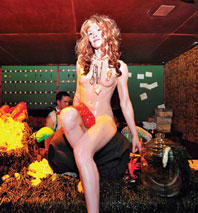
For the progressive gourmand:
Underground Eats
undergroundeats.com
Why join: If indie outfits like A Razor, A Shiny Knife defined the late-aughts ascent of the supper club, Underground Eats represents its more recent ripening. Billing itself as a purveyor of “alternative dining experiences,” the club aggregates interesting food events around the city and throws its own over-the-top affairs exclusively for members. Among its proprietary programming: a tribute to the 1939 World’s Fair with whole hogs and a Josephine Baker impersonator staged at Sleep No More’s McKittrick Hotel, and a six-course dinner cooked by George Mendes (Aldea), David Santos (Louro), and Sean Brock (Husk in Charleston).
Getting in: Underground Eats works on a referral system: Get a member to vouch for you, and you’re in. Those without an inside hook can try their luck at applying for membership online. There is no fee to join, but most events—there are up to fifteen per month—range from $40 to $350.
Exclusivity: 2.5/4
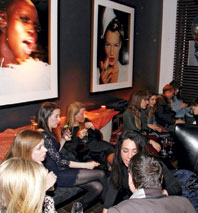
For the post-Ivy club kid:
Parlor
parlornewyork.com
Why join: Dissatisfied with the old-world trappings of the Harvard Club, a group of young Crimson alums launched this revision of the high-end social club last spring, attracting a 400-strong membership base of fashion, finance, arts, and entertainment honchos. (Without a sparkling CV, the place can feel impenetrable, but at least you needn’t be a Harvard grad to join.) The 5,000-square-foot Soho clubhouse, with its studded leather wingbacks and walls hung with Roxanne Lowit’s eighties paparazzi pics, feels more lounge than library—which is fitting, given the party-centric programming: The place really gets going after 10 p.m., when members and their guests can reserve tables for nightly D.J.-ed bashes without fear of any velvet-roped hurdles. Regular cultural discussions and gratis dinners, sometimes prepared by Top Chef toques, figure in, too.
Getting in: A two-part screening process helps Parlor sift out the unsavories. The online application probes into your professional accomplishments, favorite travel destinations, and familiarity with local cultural institutions. Next is an in-person interview. Cinch that, pay your dues—$1,500 a year plus a quarterly beverage spend of $250—and you’re in.
Exclusivity: 4/4